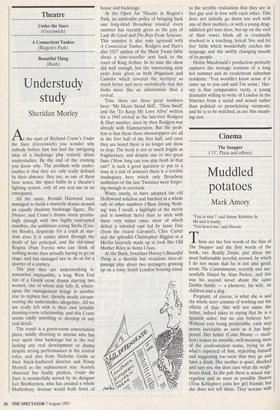Theatre
Under the Stars (Greenwich) A Connecticut Yankee (Regent's Park) Beautiful Thing (Bush)
Understudy study
Sheridan Morley At the start of Richard Crane's Under the Stars (Greenwich) you wonder why nobody before him has had the intriguing idea of a backstage play entirely about understudies. By the end of the evening you know why. The problem with under- studies is that they are only really defined by their absence: they are, as one of them here notes, the spare bulbs in a theatre's lighting system, only of any real use in an emergency.
All the same, Ronald Harwood once managed to build a masterly drama around an equally shadowy backstage figure, The Dresser, and Crane's drama starts promis- ingly enough with two highly contrasted standbys, the ambitious young Stella (Con- nie Booth), desperate for a crack at star- dom even if it comes about through the death of her principal, and the old-timer Regina (Pam Ferris) who can think of nothing worse than actually having to go on stage, and has managed not to do so for a quarter of a century.
The play they are understudying is, somewhat implausibly, a long West End run of a Greek verse drama starring two women, one of whom duly falls ill, where- upon the management brings in another star to replace her, thereby neatly circum- venting the understudies altogether. All we are really left with is their own irritable dressing-room relationship, and this Crane seems oddly unwilling to develop in any real detail.
The result is a green-room conversation piece, mildly diverting to anyone who has ever spent time backstage but in the end lacking any real development or drama despite strong performances in the central roles, and also from Nicholas Gecks as their black-leathered director and Penny Morrell as the replacement star. Acutely observed but fatally plotless, Under the Stan is wonderfully served by its designer Lez Brotherston, who has created a whole Shaftesbury Avenue world both front of
house and backstage.
At the Open Air Theatre in Regent's Park, an admirable policy of bringing back one long-dead Broadway musical every summer has recently given us the joys of Lady Be Good and The Boys From Syracuse. This summer it alas runs aground with A Connecticut Yankee, Rodgers and Hart's dire 1927 update of the Mark Twain fable about a time-traveller sent back to the court of King Arthur. In its time the show did well enough, but the intervening sixty years have given us both Brigadoon and Camelot which covered the territory so much better and more melodically that this looks more like an exhumation than a revival.
True, there are three great numbers here: 'My Heart Stood Still', 'Thou Swell' and the 'To Keep My Love Alive' written for a 1943 revival as the last-ever Rodgers & Hart number, since by then Rodgers was already with Hammerstein. But the prob- lem is that these three showstoppers are all in the first half of the first half, and once they are heard there is no longer any show to stop. The book is not so much fragile as fragmentary, and despite one or two great lines (`How long can you stay fresh in that can?' is such a good question to put to a man in a suit of armour) there is a terrible inadequacy here which only Broadway audiences of the late Twenties were forgiv- ing enough to overlook.
Wiser, surely, to have adopted the old Hollywood solution and batched in a whole raft of other numbers (`Busy Doing Noth- ing' was, I recall, a highlight of the movie and is nowhere here) than to stick with these very minor ones, most of which defeat a talented cast led by Janie Dee (from the recent Carousel), Clive Carter and the splendid Christopher Biggins as a Merlin bizarrely made up to look like Old Mother Riley as Santa Claus. At the Bush, Jonathan Harvey's Beautiful Thing is a sketchy but vivacious rites-of- passage play about two teenagers growing up on a noisy South London housing estate
to the terrible realisation that they are in fact gay and in love with each other. This does not initially go down too well with one of their mothers, or with a young drug- addicted girl next door, but up on the roof of their tower block all is eventually resolved in a touching, lyrical 'live and let live' fable which wonderfully catches the language and the swiftly changing moods of its people.
Hettie Macdonald's production perfectly captures the teenage tensions of a long hot summer and its recalcitrant suburban residents: 'You wouldn't know sense if it came up to you and said I'm sense.' Har- vey is that comparative rarity, a young dramatist willing to write of London in the Nineties from a social and sexual rather than political or proselytising viewpoint, and he is to be watched, as are this smash- ing cast.


















































 Previous page
Previous page